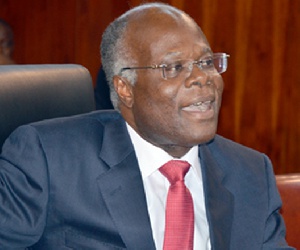The Member of Parliament for Asokwa, KT Hammond, on Wednesday mounted a strong opposition to the passage of the Right to Information (RTI) bill into law.
According to him, the bill when passed will render the country ungovernable.
“It is a recipe for disaster. It is a recipe for bad governance,” he told Starr News’ Parliamentary Correspondent Ibrahim Alhassan.
“Ministers can’t operate, governments cannot proceed effectively, governance cannot take place meaningfully,” he added.
Mr Hammond’s comments come a day after fellow legislature from Ningo Prampram Sam George described as a misplaced priority the demands of the Media Coalition on Right to Information for the bill to be passed into law.
According to Mr George, who is also a member of the Communications Committee of Parliament the passage of the bill into law will be of no consequence at all.
The Coalition was on Tuesday barred from entering the lawmaking chamber by police guards to press home their demand for the passage of the bill into law.
“I have been one of the loudest to say that the RTI is of no consequence. I think the media fraternity, you have completely…completely misplaced your priorities,” the former Presidential Staffer told Alhassan Tuesday.
He continued: “You are chasing an RTI bill, an RTI bill that will not fix any problem. Today, what will an RTI do? If we pass the RTI bill and it comes into law, all it means is that there is a designated officer in an institution who we have termed in the bill, an information officer.
“So, you send a request to an information officer, he has seven days to respond to your request. If you do the request and the information officer tells you I don’t have the information, what can you do?”
The RTI
The RTI bill was laid before Parliament by the Deputy Attorney General Joseph Kpemka Dindiok in March this year.
It has been 22 years since the first RTI bill was drafted under the auspices of the Institute of Economic Affairs, IEA and 16 years since the Executive arm of government in 2002 drafted the first RTI bill.
The draft Executive Bill was subsequently reviewed in 2003, 2005 and 2007 but was never laid in Parliament until February 5, 2010.
Collusion against RTI bill
The Centre for Democratic Development (CDD) earlier this month accused the governing New Patriotic Party and the opposition National Democratic Congress (NDC) of colluding against the Right to Information (RTI) bill.
The Centre for Democratic Development (CDD) earlier this month accused the governing New Patriotic Party and the opposition National Democratic Congress (NDC) of colluding against the Right to Information (RTI) bill.
“…If there’s one, or two or three things that the two main political parties [NPP and NDC] align, agree to, then, it is this RTI that they don’t want. I think that’s what it is,” the Deputy Director of the CDD Dr Franklin Oduro who is also the CDD’s Head of Research and Program said at a roundtable discussion on METOGU anti-corruption report in Accra.
“My own view is that these two parties have demonstrated that they don’t want the RTI. So there’s no blame game between them, the NDC and the NPP,” he added.
General News of Wednesday, 31 October 2018
Source: starrfmonline.com

















